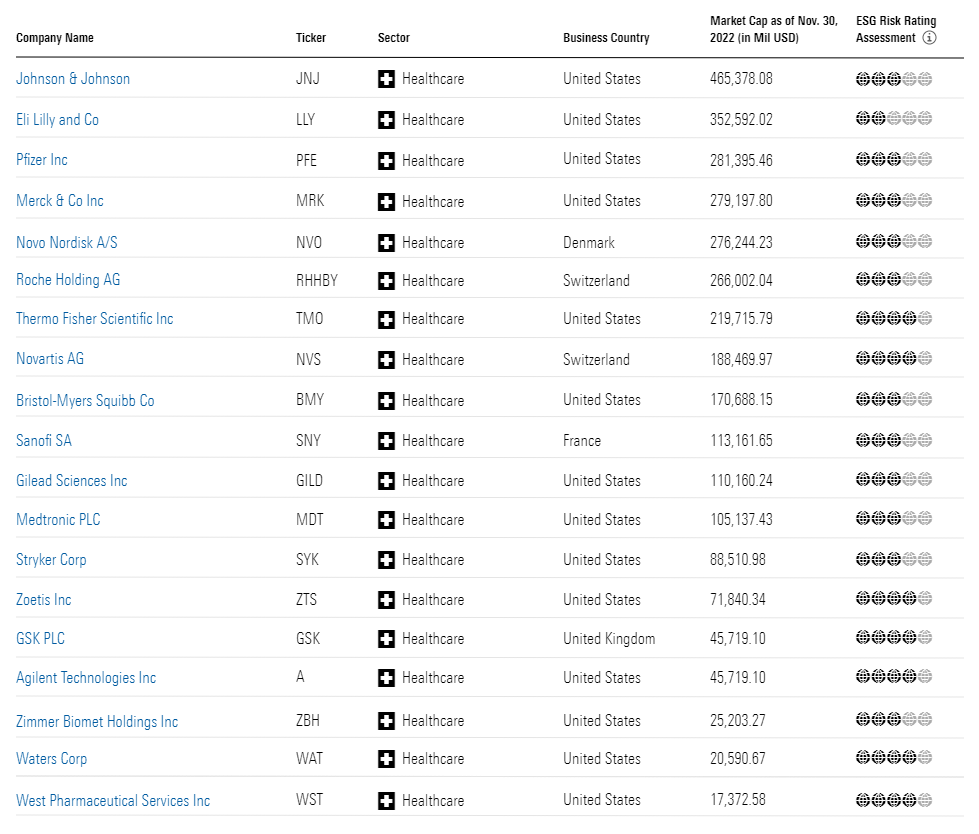Ben Slupecki, CFA, an associate analyst for Morningstar discusses how the 20 best healthcare companies largely earn their competitive advantage from intangible assets, and their stocks are great choices for an investor’s watchlist.

The strongest long-term opportunities for healthcare companies primarily fall in three industries: drug manufacturing, medical devices, and diagnostics and research.
And all 20 of the best healthcare companies to invest in have intangible assets that provide a wide moat against competitors. This intangible-asset advantage is often derived from either patents or proprietary technology.
Patents are temporary government licenses that exclude competition from copying an invention. For example, in pharmaceutical companies, patents are necessary owing to the ease with which some drugs can be replicated. Similarly, patents are vital in the medical devices industry to protect companies’ product designs.
Proprietary technology encompasses more-complex processes and tools than a company’s patents might cover—many companies keep their intellectual property as a trade secret rather than provide a public description in a patent application. In general, the more sophisticated and customized a product or service becomes, the more that proprietary technology plays a role in driving competitive advantage. In healthcare, this is seen in biopharma, medical devices, and contract research organizations.
Here, we highlight the 20 healthcare companies that made our list of the best companies to own in 2022. These companies earned their spot on the list by both having carved out wide moats and having made smart capital decisions.
This is the second major sector from that list that we’re deconstructing; previously we touched on the financial-services industry.
Because this list is built for the long term, rather than to identify presently undervalued companies, it may not be the right time to buy all these names. Rather, we believe these healthcare companies are strong choices for an investor’s watchlist.
You should consider buying only when they’re trading below our price/fair value estimate, which assesses whether a stock’s price is high or low compared with its fundamental value.
Intangible Assets Give Drug Manufacturers Their Edge
All the drug manufacturers on the best companies list, both general and specialty, gain an edge from their intangible assets.
Pfizer PFE is a prominent member of the group. “Pfizer’s patent-protected drugs carry strong pricing power that enables the firm to generate returns on invested capital in excess of its cost of capital,” writes Morningstar sector director Damien Conover. “The patents give the company time to develop the next generation of drugs before generic competition arises.”
Johnson & Johnson JNJ, the world’s largest and most diverse healthcare firm, with a market cap of $420 billion, also thrives in this area. Conover notes that Johnson & Johnson’s wide moat is “supported by intellectual property in the drug group … and strong brand power from the consumer group. Despite carrying some lower-margin divisions, J&J maintains strong pricing power and has posted gross margins above 70% during the past four years, validating its strong competitive position.”
Nine of the 20 companies with a moat driven by intangible assets have an additional moat source, either a cost advantage or a high switching cost.
Switching Costs Aid Medical Device and Diagnostic Industries
Of the six qualifying companies in either the diagnostic and research or medical devices industries, all have an advantage from intangible assets and five further benefit from switching costs. (Medtronic MDT is the lone company among them that doesn’t have a switching cost advantage.)
With a market cap of $200 billion, Thermo Fisher Scientific TMO is the largest of the diagnostics and research companies on the list. Thermo Fisher sells scientific instruments and laboratory equipment, diagnostics consumables, and life science reagents.
Like key competitors Agilent A and Waters WAT, Thermo Fisher’s analytical instrument business benefits intangible assets and switching costs, says Morningstar Holland’s director of equity research Alex Morozov. “The intangible asset is the firm’s differentiated technology and its leadership positions within tools such as mass spectrometry, chromatography, microscopy, and others. … The business is also rather sticky, particularly within the biopharma end market, where the regulatory process assures high switching costs. Production methods have to stay uniform throughout the lifecycle of a drug, which often extends beyond the lifecycle of a typical mass spectrometer.”
Medical devices, for their part, have high switching costs because surgeons develop expertise in using a differentiated set of tools and device systems have component parts that are designed to work together.
“The highest switching costs in medical devices is in orthopedics, where all the device makers have their own differentiated implants and the tools to install the implants,” says Morningstar senior analyst Debbie Wang.
“It takes years for the orthopedic surgeons to become practiced enough on one vendor’s tools and implants to deliver optimal patient outcomes, and after they have mastered them, they are reluctant to switch to another vendor where they’d have to relearn some of it,” Wang explains. “For this reason, the switching costs are the highest for companies like Zimmer Biomet ZBH and Stryker SYK.”
The Top Biotechnology Company
Novo Nordisk NVO, for its part, is the lone representative for the biotechnology industry.
Novo Nordisk is the leading provider of diabetes-care products in the world, holding 50% of world market share. The company has two moat sources: intangible assets and cost advantage. As for the latter, Morningstar sector strategist Karen Andersen notes: “Efficient manufacturing techniques and economies of scale allow Novo’s insulin business to provide strong global profitability.”
Morningstar Disclaimers:
The opinions, information, data, and analyses presented herein do not constitute investment advice; are provided as of the date written; and are subject to change without notice. Every effort has been made to ensure the accuracy of the information provided, but Morningstar makes no warranty, express or implied regarding such information. The information presented herein will be deemed to be superseded by any subsequent versions of this document. Except as otherwise required by law, Morningstar, Inc or its subsidiaries shall not be responsible for any trading decisions, damages or losses resulting from, or related to, the information, data, analyses or opinions or their use. Past performance is not a guide to future returns. The value of investments may go down as well as up and an investor may not get back the amount invested. Reference to any specific security is not a recommendation to buy or sell that security. It is important to note that investments in securities involve risk, including as a result of market and general economic conditions, and will not always be profitable. Indexes are unmanaged and not available for direct investment.
This commentary may contain certain forward-looking statements. We use words such as “expects”, “anticipates”, “believes”, “estimates”, “forecasts”, and similar expressions to identify forward-looking statements. Such forward-looking statements involve known and unknown risks, uncertainties and other factors which may cause the actual results to differ materially and/or substantially from any future results, performance or achievements expressed or implied by those projected in the forward-looking statements for any reason.
The Report and its contents are not directed to, or intended for distribution to or use by, any person or entity who is a citizen or resident of or located in any locality, state, country or other jurisdiction where such distribution, publication, availability or use would be contrary to law or regulation or which would subject Morningstar or its subsidiaries or affiliates to any registration or licensing requirements in such jurisdiction.
MeDirect Disclaimers:
This information has been accurately reproduced, as received from Morningstar, Inc. No information has been omitted which would render the reproduced information inaccurate or misleading. This information is being distributed by MeDirect Bank (Malta) plc to its customers. The information contained in this document is for general information purposes only and is not intended to provide legal or other professional advice nor does it commit MeDirect Bank (Malta) plc to any obligation whatsoever. The information available in this document is not intended to be a suggestion, recommendation or solicitation to buy, hold or sell, any securities and is not guaranteed as to accuracy or completeness.
The financial instruments discussed in the document may not be suitable for all investors and investors must make their own informed decisions and seek their own advice regarding the appropriateness of investing in financial instruments or implementing strategies discussed herein.
If you invest in this product you may lose some or all of the money you invest. The value of your investment may go down as well as up. A commission or sales fee may be charged at the time of the initial purchase for an investment. Any income you get from this investment may go down as well as up. This product may be affected by changes in currency exchange rate movements thereby affecting your investment return therefrom. Any decision to invest should always be based upon the details contained in the Prospectus and Key Investor Information Document (KIID), which may be obtained from MeDirect Bank (Malta) plc.





